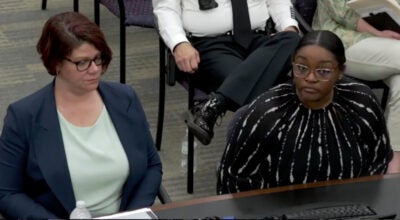Republicans try to beat past tax reform dangers
Published 12:00 am Monday, April 8, 2013
RALEIGH (AP) — Republican legislative leaders and Gov. Pat McCrory brimmed with optimism early this year about prospects for passing a North Carolina tax code overhaul that most agree has been needed for decades. Still, they didn’t predict smooth sailing.
General Assembly members had seen previous Democratic governors and lawmakers fall short on reform. They couldn’t work out hundreds of details or overcome opposition from interest groups that didn’t want to get taxed more or lose their prized loopholes.
“The biggest challenge is whether political leaders have the will to adopt tax reform,” said tax expert Sabra Faires, a former longtime legislative and state government staff attorney. “Past administrations haven’t had that will, despite repeated studies on the need for it.”
As the first detailed proposals get scrutinized in the Senate, similar obstacles with past efforts are surfacing. Fiscal advocacy groups say proposals either hurt the poor or don’t go far enough for job growth. Trade and government associations are criticizing the fine print.
“If we want to have a stronger economy, we need to make sure in shifting taxes from one sector to another we don’t shift them to the real estate sector,” said Mark Zimmerman of Chapel Hill, a leader in the North Carolina Association of Realtors. The group has created a website raising alarms about possible taxes on real estate sales and the elimination of home-related tax deductions.
While Republicans and McCrory agree they want to lower corporate and individual income tax rates, there’s no strong consensus yet about how far to go and whether to eliminate all income taxes over time — an expensive proposition Senate Republicans have championed.
“If you don’t know where you want to go, then you’ll never get there. And the bottom line is we have a destination, that being zero personal (income tax) and ultimately zero corporate,” said Sen. Bob Rucho, R-Mecklenburg, who is leading the Senate’s tax reform efforts.
House Republicans and McCrory have sounded more cautious about the scope of an overhaul this year, worried about changes that could result in shortfalls just as tax collections are starting to rebound.
“It has to be done in a methodical, maybe multiyear process so that we do not destabilize what … still continues to be a fragile economy,” House Speaker Thom Tillis, R-Mecklenburg, told a business-friendly audience several weeks ago.
House GOP leaders haven’t yet offered detailed proposals. McCrory says he initially wants to lower income tax rates to those in South Carolina and Virginia to make North Carolina more attractive to companies seeking to expand. North Carolina’s corporate rate of 6.9 percent and top individual bracket of 7.75 percent are among the highest in the Southeast.
McCrory told municipal leaders meeting in Raleigh two weeks ago about a phone call he had with an unidentified company executive considering to set up shop in North Carolina. The executive asked, “what is your income tax there in North Carolina? And when I told them, there was a tremendous pause,” McCrory told them.
Several study panels and blue-ribbon commissions meeting over the past two decades have essentially reached the same conclusion — North Carolina’s code is designed for the old economy of textiles and furniture rather than for service and technology sectors.
Their tax reform mantra has been to “broaden the base and lower the rate.” That means by expanding the types of activities subject to the sales or income tax — by eliminating exemptions or credits — more revenue can be collected. Overall rates can then be lowered while still collecting the same amounts through a more uniform method.
The only comprehensive tax overhaul rolled out to date is a bipartisan measure to lower both corporate and individual income tax rates to 6 percent. The combined local and state sales tax that most consumers pay would fall from 6.75 percent to 6.5 percent. Services subject to the sales tax would expand to things like automobile repairs, equipment installation and landscaping. It also attempts to streamline tax rules, such as those requiring different rates on tickets to plays and movies.
Right now “you only pay a sales tax on entertainment where there’s somebody moving around,” quipped bill co-sponsor Sen. Dan Clodfelter, D-Mecklenburg, during discussion of the bill in the Senate Finance Committee last week.
The bill was changed to address concerns of municipalities worried about lost revenue. But another complaint surfaced in a letter from the International Health, Racquet and Sportsclub Association, which is unhappy the bill would subject fitness clubs to the sales tax.
“Taxing health club services increases the cost consumers must pay for investing in their long-term health and well-being, and worsens the physical and fiscal health of this state,” association president Joe Moore wrote to senators.
Rucho and Senate leader Phil Berger, R-Rockingham, are primary sponsors of another bill that would reduce the individual income tax rate over time to 4 percent in 2016. A study committee also would examine how to eliminate the tax. Individual income taxes raise more than $10 billion annually, so any elimination would require taxing many more services, and increasing the sales tax well beyond the current 6.75 percent.
Berger said Senate may be a little ahead of the House and McCrory on tax reform but believes “we’ll all end up at the same place.”



